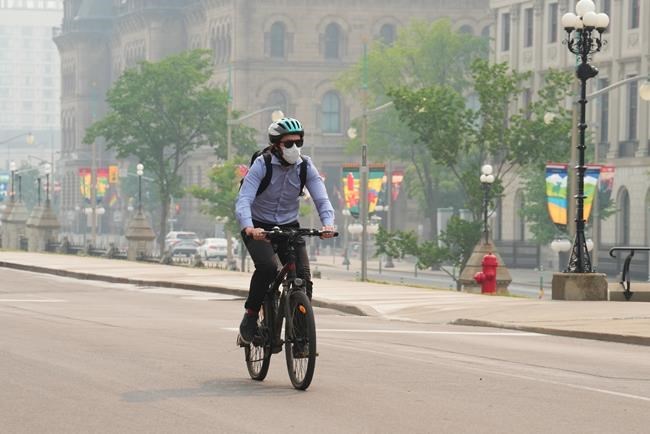
A cyclist wears a mask due to poor air quality conditions as smoke from wildfires in Ontario and Quebec hangs over Ottawa on Tuesday, June 6, 2023. The death of a nine-year-old B.C. boy whose asthma was exacerbated by wildfire smoke is a horrific example of how dangerous poor air quality can be for people suffering from underlying respiratory and cardiac conditions, experts say. THE CANADIAN PRESS/Sean Kilpatrick
July 20, 2023 - 1:00 AM
The death of a nine-year-old B.C. boy whose asthma was exacerbated by wildfire smoke is a horrific example of how dangerous poor air quality can be for people suffering from underlying respiratory and cardiac conditions, experts say.
When wildfire smoke pollutes the air, "there is definitely an increase in asthma exacerbations," said Dr. Anne Hicks, clinical lead of the children's environmental health clinic at the University of Alberta.
In addition to asthma, research has shown that wildfire smoke is associated with more hospital visits for both children and adults with other lung conditions, such asviral infections, pneumonia and chronic obstructive pulmonary disease (COPD), as well as heart attacks and strokes, Hicks said.
Here are some things you can do to protect yourself and your children.
USE THE AIR QUALITY HEALTH INDEX
Environment Canada has an Air Quality Health Index (AQHI) available online, where people can check the level of pollution in their communities. You can find it at https://weather.gc.ca/airquality/pages/index_e.html
A rating of 1-3 is low risk, 4-6 is moderate risk, 7-10 is high risk and over 10 is very high risk.
But many people with asthma or other chronic conditions — as well as infants, young children, pregnant people and seniors — feel the effects of smoke and other air pollution at lower levels than people who are very healthy.
"As an example, some of my asthma patients have exacerbations by an AQHI of 5 and we provide letters to their school advocating for them to have access to indoor activities if there is a risk of triggering asthma during outdoor recess," Hicks said.
People should get to know what level of air pollution affects them and use the index to modify their activities accordingly, she said.
STAY INDOORS IF AIR QUALITY IS BAD FOR YOU
"It's really important to avoid exposure," Hicks said. "It becomes harder and harder, of course, when you're looking at air pollution, when it's happening every single day."
Stay inside with the windows closed as much as possible and use an air purifier, said Jeffrey Brook, an associate professor at the University of Toronto's Dalla Lana School of Public Health, who specializes in air quality and pollution exposure.
WHAT TO LOOK FOR IN AN AIR PURIFIER FOR YOUR HOME
A high-quality air purifier should have a HEPA (high efficiency particulate air) filter. Or, look for a filter with a MERV (minimum efficiency reporting value) rating of at least 13, Brook said.
If you can't afford to buy a high-quality air purifier unit, you can make one, Brook said. Take a look at YouTube for instructions, he suggested, but essentially you'll need a box fan, MERV 13-rated furnace filters, duct tape and some cardboard.
BE MINDFUL OF HEAT RISKS
If you're inside a home with the windows closed and no air conditioning, make sure you're not trading one health hazard for another by overheating, Hicks said.
"You do have to be concerned for heat-related exposure, so heat exhaustion or heat stroke, which are also very serious and will impact children more than adults," she said.
In addition, she said, heat itself can trigger asthma attacks.
If it's hot inside your home and the air quality outside is poor, consider going to a community cooling centre, a shopping mall or a library.
WEAR A MASK IF YOU NEED TO BE OUTSIDE
"Masks are a good harm mitigation tool when you need to be outside, for instance to walk to work or school," Hicks said.
Surgical masks can filter out up to 20 per cent of smoke and other particulate matter and well-fitting N95 respirators can filter out up to 80 per cent.
They come in kids' sizes and have either ear loops or around-the-head elastics, she said.
Although an N95 mask provides the most protection from air pollution, the surgical mask is still worth wearing if that's more comfortable, Brook said.
MAKE SURE ASTHMA IS WELL CONTROLLED IN THE FIRST PLACE
Adults and children with asthma should always have a supply of both their "controller" medications and their "reliever" medications.
"Controller" medications are usually taken every day to keep inflammation in the lungs down and help to prevent asthma attacks. They usually contain an inhaled steroid.
"Reliever" medications are the inhalers that people take if they are suffering from worsened asthma, including asthma attacks. They are bronchodilators, which relax the muscles in the lungs and widen the airways. Salbutamol (brand name Ventolin) is a common inhaler medication.
People with asthma should always keep their reliever inhalers on them, just as a person with a severe allergy carries an EpiPen, Hicks said.
And no matter how well controlled the asthma usually is, if you're at all worried about yourself or your child, "definitely head to the hospital," she said.
"Many families who are meticulous with care have children who have asthma exacerbations, including severe ones," Hicks said.
This report by The Canadian Press was first published July 20, 2023.
Canadian Press health coverage receives support through a partnership with the Canadian Medical Association. CP is solely responsible for this content.
News from © The Canadian Press, 2023